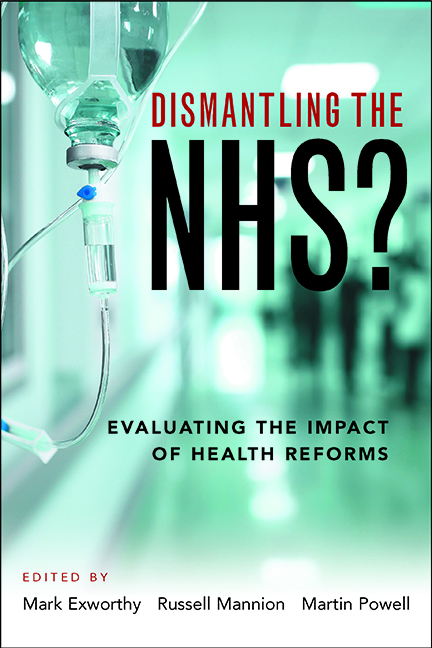eleven - Provider plurality and supply-side reform
Published online by Cambridge University Press: 05 April 2022
Summary
Polymorphous plural providers
Not only healthcare financing but also its provision was nationalised when the NHS was founded. Besides guaranteeing access to healthcare, Bevan and the other founders also intended to – and eventually largely did – ‘ level up’ a supply side comprised of diversely-owned providers which provided correspondingly diverse levels of service access, quality and responsiveness to healthcare needs. Since 1979 neoliberal ‘reforms’ of the NHS have had a supply side component, that of introducing ‘provider plurality’ under which a range of differentlyowned organisations provide NHS-funded services:
1. public firms, that is, state-owned providers (for example, NHS trusts) with a degree of financial autonomy and discretion in their use of resources.
2. professional partnerships (for example, most general practices), which a group of professionals jointly own and manage, and which employ other staff.
3. shareholder-owned, dividend-maximising firms including: a) private equity firms, whose shares are not publicly traded. b) corporations, whose shares are publicly traded.
4. proprietary (that is, owner-managed firms), whose shares are not usually publicly traded.
5. social enterprises, an ill-defined category ranging from not-forprofit providers which differ from corporations mainly in not distributing profits to shareholders to organisations whose workforce and/or consumers have a voice in controlling the organisation (Allen et al, 2011).
6. charitable, voluntary and self-help organisations which depend heavily on volunteer labour.
7. co-operatives and mutuals, democratically controlled by their workforce, consumers or subscribers.
In the circumstances that most NHS services have hitherto been provided by public organisations and professional partnerships, proposals for greater provider diversity mean shifting the proportion towards types (3) to (7) above. Whatever the effect on healthcare supply, such a contentious policy has already greatly increased the supply of euphemism, confusion and obfuscation in health policy debates. This chapter attempts to give an overview of the empirical patterns of development, and unpick some of the conceptual confusions.
Provider plurality and supply side reform before 2010
Until the late 1970s, the most salient English health policy debates were electoral bidding competitions about spending on the NHS and about the effect of private medical practice on NHS waiting lists.Parliament occasionally heard proposals to retract public funding and provider ownership at the margins of the NHS, raise prescription and other NHS charges, retain ‘amenity’ beds in NHS hospitals (for a fee patients could obtain better ‘hotel’ services), and allow consultants greater private practice.
- Type
- Chapter
- Information
- Dismantling the NHS?Evaluating the Impact of Health Reforms, pp. 211 - 232Publisher: Bristol University PressPrint publication year: 2016



